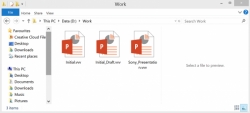SureShot Software Will Help to Recover .vvv Encrypted Files and Fight TeslaCrypt Ransomware
TeslaCrypt adds .vvv at the end of most of the files is a sure sign of ransomware invasion. If most of the files on your device have their names modified in the above way, blame it all on TeslaCrypt virus.

Los Angeles, CA, December 10, 2015 --(PR.com)-- The virus has been active in the wild since the beginning of February 2015. The .vvv strain is deemed to be its eighth edition. It differs from previous, .ccc strain, in that it adds three 'v' letters instead of 'c' letters. Previous releases also typically added a string of three letters as a file suffix. The letters in the string varied from case to case. There was at least one version that did not modify file names.
Versions of TeslaCrypt malware vary not only in the way they modify the names of affected files. The differences are rather about the program code, the way the malware addresses its victims, the way the payment is arranged.
In case of .vvv variant of the ransomware in question, something quite unexpected has happened. Some variants of .vvv strain may pretend to be another virus called CryptoWall. The actual reason for this trick is not quite clear. A security solution, if good enough, would anyway detect the malware as a variant of TeslaCrypt and thus remove .vvv virus.
Basically, the two families of ransomware, CryptoWall and TestalCrypt, differ clearly. They apply totally unrelated cryptic standards and stick to their customized distribution patterns, billing systems.
The .vvv strain of TeslaCrypt is the first version of the virus that fakes CryptoWall.
All other traits of .vvv malware remain true to its type. The virus hops into computer system via exploit kit. The kit makes use of unpatched vulnerabilities in the software installed on victim’s computer. Thereby, updating your software is of critical importance.
Once inside the target device, the malware scans all the memories available from the affected machine. That covers both removable and hard drive memory. Network resources are also subject to its scanning.
The scan targets nearly any type of data. The data detected get encrypted using AES standard. This is the standard that CryptoWall does not use. The latter infection sticks to RSA-2048 routine.
Removal of .vvv ransomware is strongly recommended. However, it does not decrypt affected data as such. To cope with the challenge of data decryption a victim is advised to make use of one of the recovery tools and methods rather than paying the ransom as demanded by the rascals.
The ransom amounts to at least USD 400 and is to be paid in BTC (cryptocurrency). Once paid, private key is to be dispatched to the victim. The key is the only ultimate solution to decrypt the encrypted data.
Again, these are the cyber criminals who run the scam. None can provide any guarantees that they will dispatch the private key, if you pay as requested.
Even if you have paid the ransom, you still need to get rid of .vvv ransomware.
To sum it up, it is preferable that you recover the data affected by the virus. Prior to rescuing the files rendered unreadable by the infection, remove .vvv ransomware.
Versions of TeslaCrypt malware vary not only in the way they modify the names of affected files. The differences are rather about the program code, the way the malware addresses its victims, the way the payment is arranged.
In case of .vvv variant of the ransomware in question, something quite unexpected has happened. Some variants of .vvv strain may pretend to be another virus called CryptoWall. The actual reason for this trick is not quite clear. A security solution, if good enough, would anyway detect the malware as a variant of TeslaCrypt and thus remove .vvv virus.
Basically, the two families of ransomware, CryptoWall and TestalCrypt, differ clearly. They apply totally unrelated cryptic standards and stick to their customized distribution patterns, billing systems.
The .vvv strain of TeslaCrypt is the first version of the virus that fakes CryptoWall.
All other traits of .vvv malware remain true to its type. The virus hops into computer system via exploit kit. The kit makes use of unpatched vulnerabilities in the software installed on victim’s computer. Thereby, updating your software is of critical importance.
Once inside the target device, the malware scans all the memories available from the affected machine. That covers both removable and hard drive memory. Network resources are also subject to its scanning.
The scan targets nearly any type of data. The data detected get encrypted using AES standard. This is the standard that CryptoWall does not use. The latter infection sticks to RSA-2048 routine.
Removal of .vvv ransomware is strongly recommended. However, it does not decrypt affected data as such. To cope with the challenge of data decryption a victim is advised to make use of one of the recovery tools and methods rather than paying the ransom as demanded by the rascals.
The ransom amounts to at least USD 400 and is to be paid in BTC (cryptocurrency). Once paid, private key is to be dispatched to the victim. The key is the only ultimate solution to decrypt the encrypted data.
Again, these are the cyber criminals who run the scam. None can provide any guarantees that they will dispatch the private key, if you pay as requested.
Even if you have paid the ransom, you still need to get rid of .vvv ransomware.
To sum it up, it is preferable that you recover the data affected by the virus. Prior to rescuing the files rendered unreadable by the infection, remove .vvv ransomware.
Contact
SureShot
Gordon Serlikis
844-326-2924
www.sureshotsoftware.com
Gordon Serlikis
844-326-2924
www.sureshotsoftware.com
Categories
